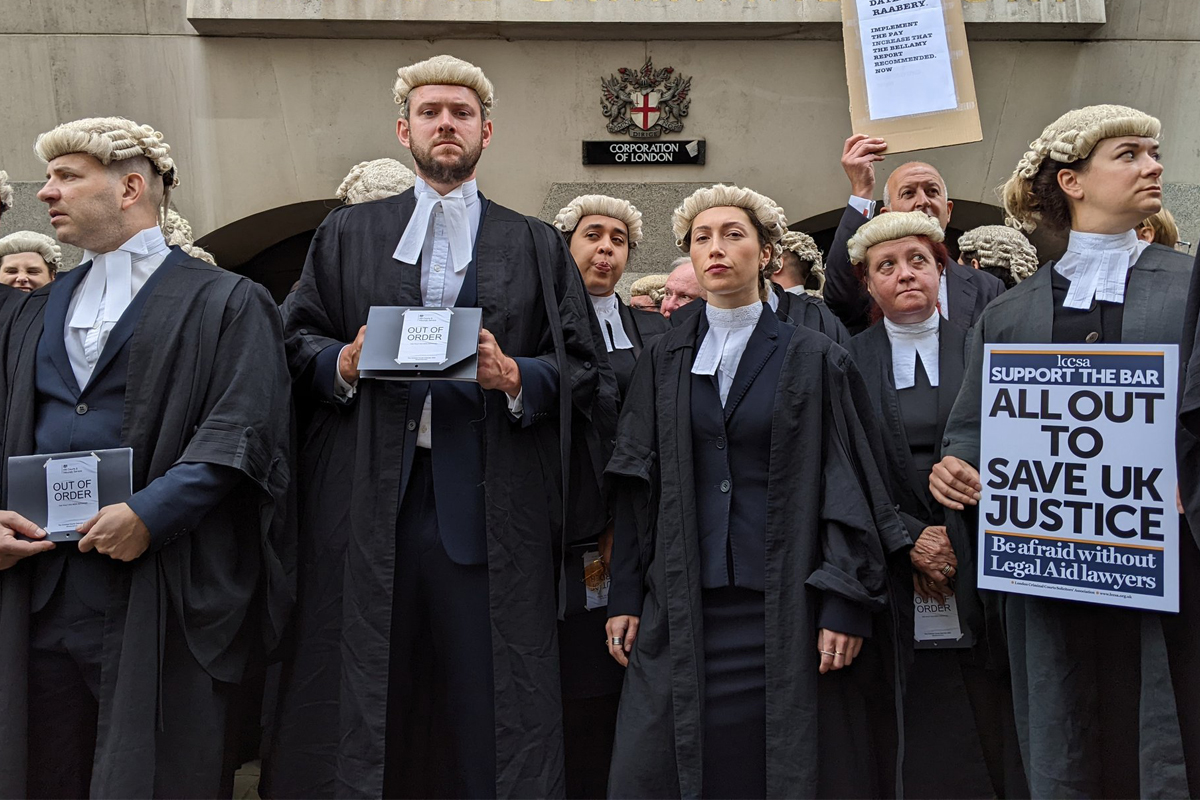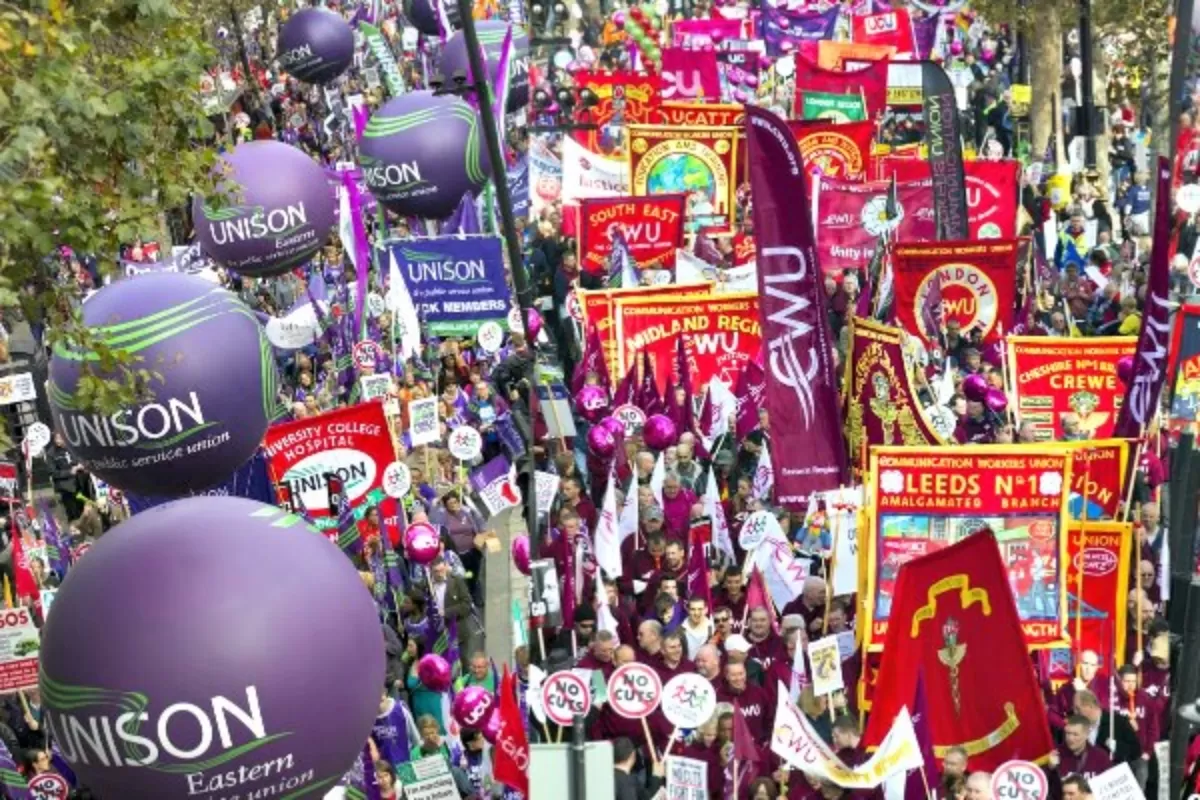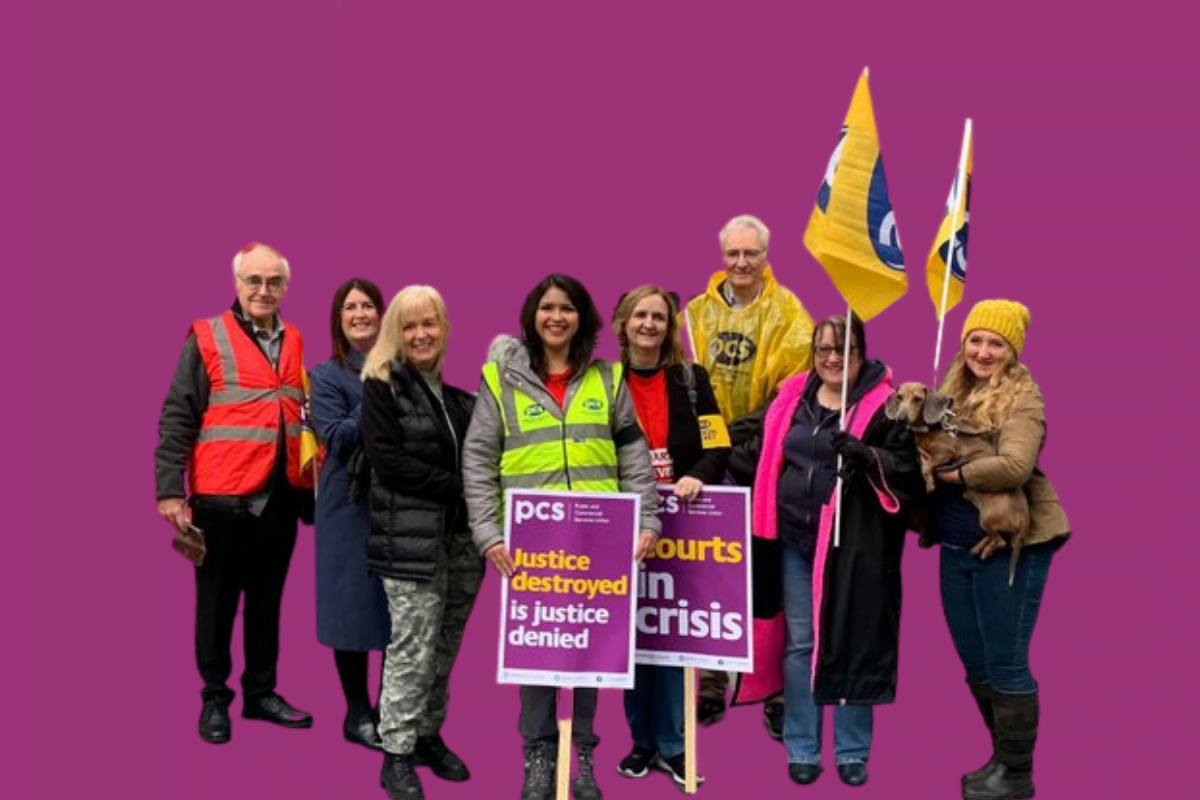After weeks of indefinite action, criminal barristers have voted to accept the government’s offer and suspend their strike. But with legal aid solicitors threatening to stop work, and court staff walking out, the fightback is far from over.
Earlier this month, criminal barristers narrowly voted – by a margin of 57% to 43% – to end their historic walkout against the crisis in the criminal justice system.
The walkouts, which began in June, and built up to indefinite strike action by September, were a remarkable last stand in a dispute that has been ongoing for around three years.
These strikes involved barristers breaching their contracts by refusing to attend court for cases.
On initial viewing, the Tory government’s offer of a 15% increase in fees for both new and existing cases may seem to be a significant victory for criminal barristers.
But, on closer inspection, it becomes apparent that the ‘deal’ kicks the can down the road, at best, and will put barristers back in the exact same position in several years’ time.
System in crisis
 Despite the government’s assertions, the current crisis in the criminal justice system has little to do with the delays caused by the COVID pandemic.
Despite the government’s assertions, the current crisis in the criminal justice system has little to do with the delays caused by the COVID pandemic.
In fact, it is 12 years of austerity that has pushed legal aid to breaking point. There has been an exodus from the profession; waiting times have soared; and hundreds of courts have closed.
The situation was at such a crisis point that, even in late 2019, the government’s own review concluded that an immediate 15% increase in legal aid fees for both barristers and solicitors was required to prevent immediate collapse.
But the Tories failed to address the mounting problems, making excuse after excuse. It was clear that something had to give. And in the end, what did give was barristers’ patience.
What began as limited action in March (refusing to accept returns back) quickly turned into a wildcat strike, with barristers refusing to attend court. By the end of the summer, this had escalated into all-out action.
The barristers’ representative body, the Criminal Bar Association (CBA), correctly called for an immediate 25% increase in fees: factoring in the recommended 15% increase, plus the recent spike in inflation.
During the struggle, barristers showed a remarkable willingness to fight, with the strike remaining rock solid throughout. This was helped by solidarity from other unions and activists, drawing the CBA and its members closer to the rest of the labour movement.
This was in spite of divisive smears from the right-wing press and politicians, who accused this increasingly-squeezed layer of workers of being ‘too privileged’ to be taking action.
Sticking plaster
 After a month-and-a-half of barristers refusing to attend court, the government was forced into making some limited concessions.
After a month-and-a-half of barristers refusing to attend court, the government was forced into making some limited concessions.
Despite previously claiming that the CBA’s demands were impossible to meet, the Tories made an offer for all barristers’ fees for current and future cases to be increased by 15%.
This had a number of strings attached, however – including a commitment from barristers that they would work with the government to help reduce the huge backlog of cases.
At the same time, many barristers who voted against the deal pointed out that there was no commitment from the government regarding future fee increases. This means that barristers could be back in the same position in two years’ time, given inflation.
Likewise, the deal means that barristers will be forced to work with the government. Unsurprisingly, however, many find it hard to trust that the Tories will keep their side of the bargain, having spent the last four months briefing the press about how barristers are ‘greedy’ for rejecting a 15% increase in fees.
Momentum lost
The ballot result – to suspend the CBA’s action – was met with disappointment by some barristers, who correctly believed that the Tories were on the ropes. Further meaningful concessions could therefore have been won, if the walkout had continued.
Unlike previous ballots conducted by the CBA on offers made by the government, no recommendation was made by the leadership. This ‘neutral’ stance was apparently taken so that the CBA could be seen as ‘representative’ of its members’ views.
This was clearly a mistake. Many barristers have significant trust in the leadership of the profession. And those at the top conducting the negotiations with the government were in the best position to see that the full demand of a 25% increase could have been won, if the strike had escalated and broadened out.
The CBA’s leadership has claimed that the action has merely been suspended, and that the strike will be reinstated if the government does not keep to the agreement.
While this may be formally true, it ignores the importance of energy and inertia when it comes to the dynamics of any struggle.
It took a long time for some barristers to come around to the idea that strike action was required in order to force the government to make a meaningful offer. But once mobilised and organised, the barristers gained confidence and strength.
Unfortunately, this head of steam has now dissipated. And it always takes longer to rebuild momentum once it’s lost.
Wider fight
The Tories may be breathing a sigh of relief, with barristers back in the courts, and cases once again being processed.
In reality, however, it is clear that the barristers’ struggle is just one front in a wider fight across the criminal justice system.
With a large proportion of criminal defence solicitors aged over 40, for example, and very few new trainees coming through each year, the very future of the profession is on the line.
The government has not yet put forward proposals for increased fees, and has allegedly not even begun discussions with the organisations representing solicitors.
On paper, the Law Society is a representative body for solicitors. Yet it has hardly ever expressed any view on solicitors’ pay.
In a recent remarkable statement, however, the society directly threatened to advise solicitors’ firms to stop doing criminal defence work, as it would have no viable future unless fees were also increased by 15%.
In the words of Law Society President I. Stephanie Boyce:
“If solicitors do not get parity on the bare minimum 15% recommended by Lord Bellamy, the Ministry of Justice will have made it clear that there is no future in criminal defence practice and we will suggest our members do not undertake it. No responsible organisation could truthfully say otherwise.”
There are much greater difficulties facing solicitors when it comes to engaging in action similar to the barristers, due to legal and professional obligations. Nevertheless, it is entirely possible that solicitors will be formally discouraged from continuing in criminal defence in the coming period.
Court staff strike
At the same time, court staff organised in the PCS union are in the middle of a nine-day-long walkout, from 22-30 October. The strike is in protest against a new IT system (the Common Platform System), which has been steamrolled through despite serious issues that have resulted in increased workloads for staff.
Numerous problems have been reported. This includes incorrect bail conditions being recorded against the wrong defendant. Some cases even have disappeared from the system entirely. The system has caused so many problems that one judge, correctly, called it “rubbish”.
Some have gone as far as calling the system the “next Horizon” – a reference to the infamous Post Office IT system that resulted in hundreds of postmasters being wrongly accused of theft and jailed. Now, it seems almost inevitable that history will repeat itself, and that defendants will face serious miscarriages of justice as a result.
At the same time, those in the criminal justice system entering into struggle against the government will no doubt be inspired by the recent victory achieved by outsourced court security staff.
The security guards, also organised in PCS, have gained significant concessions – including a 8.3% pay rise – following a strike over the summer.
Unite the struggles
 As with all public services at the present time, the criminal justice system is facing a fight for its future. Years of austerity have brought it to the brink. And Rishi Sunak and the Tories have indicated that worse is to follow.
As with all public services at the present time, the criminal justice system is facing a fight for its future. Years of austerity have brought it to the brink. And Rishi Sunak and the Tories have indicated that worse is to follow.
The struggle against cuts to legal aid and those taking place in the wider justice system are certainly not isolated. A strikewave has broken out across Britain in recent months. And this shows no signs of receding.
As many criminal barristers have realised throughout their walkout, those in the justice system are fighting the same battle as rail workers, NHS staff, and local government workers.
The fight to properly fund the justice system must therefore be linked to the fight to defend all public services; to end austerity; and to make the billionaires pay for this crisis.
This means coordinating action and uniting the struggles across the movement, and mobilising workers around a bold socialist programme.
Capitalism has proven itself incapable of meeting even the most basic of demands. What is needed is a mass campaign that aims to not only bring down this crisis-ridden Tory government, but also the bankrupt system that they represent.






